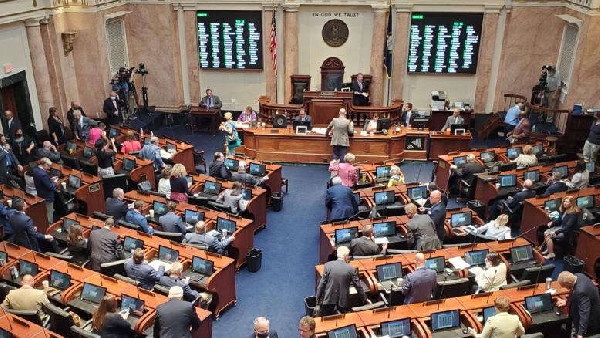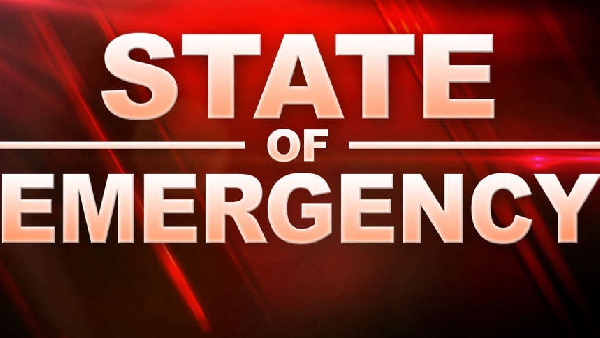A key House Republican has proposed gradually reducing Kentucky’s individual income tax rate, with the long-term goal of eliminating the levy

FRANKFORT, Ky. (AP) — A key House Republican proposed gradually reducing Kentucky's individual income tax — with the long-term goal of eliminating the levy — as part of a sweeping measure introduced Friday that would extend the state sales tax to a host of services.
The long-awaited tax overhaul measure was filed by House Appropriations and Revenue Committee Chairman Jason Petrie, who said the goal is to promote strong, sustainable growth in the state.
Under the bill, the state's 5% personal income tax rate would be lowered incrementally over a period of years until it is eliminated, according to a news release from House GOP leadership.
The first reduction would be next Jan. 1, when the rate would drop to 4%, it said. The percentage-point drop would save Kentucky taxpayers an estimated $1 billion.
“We have been very open about our goal to let people keep more of their hard-earned money rather than collecting it for the government to determine how to spend,” Petrie said. “Population growth is a necessary component of long-term growth in Kentucky and is affected substantially by our tax structure.”
The bill would require the state to meet revenue targets before more income tax rate cuts occurred.
The sweeping measure— House Bill 8 — included no reduction in the state corporate income tax.
To broaden the tax base, the proposal would extend the sales tax to a number of services. Among those targeted would be car rentals and Uber and Lyft transportation services, rental services such as Airbnb and advertising, marketing and graphic design services.
Other targeted services included in the bill include residential and nonresidential security systems, bodyguard and self-protection services, process servers, valet and parking services, pleasure watercraft docking, entertainment venues and event space rentals, legislative and executive branch lobbying, cosmetic surgery procedures (non-medically necessary), personal financial planning, private mail services, road and travel services, executive employee recruitment services, unsolicited telemarketing services and public opinion research.
Under the bill, groceries and medication would remain exempt from the state sales tax.
Another key provision would implement a “battery reclamation fee” on electric and hybrid vehicles and a tax on the use of fee-for-service charging stations. Those revenues would flow into the state road fund and general fund.
Gov. Andy Beshear wasn't consulted by House Republicans on the proposal, said his spokeswoman, Crystal Staley. The Democratic governor routinely touts Kentucky's strong economic recovery from the COVID-19 pandemic, pointing to records set last year for job creation and investments.
Budget and taxation measures will dominate work in the final weeks of this year’s legislative session. The unveiling of the House tax measure sparked quick reaction.
The Kentucky Chamber of Commerce, at the forefront of the push to modernize the state's tax code, said it was encouraged by the bill's introduction.
“Kentucky must be competitive, and significant changes to our tax code are a crucial part of that equation,” Kentucky Chamber senior executive Kate Shanks said. “We agree driving down income taxes to put more hard-earned money back into the pockets of Kentuckians is key to making Kentucky an attractive place to live and work.”
The Kentucky Center for Economic Policy, however, said the proposed tax cuts in the House bill were “skewed heavily to the rich.” It said the few “modest revenue raisers” in the measure wouldn't come close to offsetting lost income tax revenue. The result, it said, would be devastating for schools, health programs and other human services reliant on state funding.
When the House passed its version of the next two-year state budget last month, it backed increased education spending and a pay raise for state employees. But the amount of spending was less than Beshear had recommended, as Republicans left plenty of leeway to consider tax cuts. The Senate is reviewing the budget but hasn’t yet revealed its version. Senators also would get to put their imprint on any House-passed tax measure. The GOP has supermajorities in both chambers.
Last week, Beshear endorsed legislation to temporarily cut the state sales tax rate to help cushion Kentuckians from rising consumer prices. The bill proposes a one-year cut in the state sales tax rate from 6% to 5%. That cut, if enacted, would deliver $873 million in tax relief for Kentuckians struggling with rising prices, the governor said.
On Thursday, a GOP-led Senate panel advanced a bill that would deliver income tax rebates of up to $500 per individual and up to $1,000 per household. Sen. Chris McDaniel said it would offer some relief from surging inflation, adding it was “completely separate” from any broad tax measure.

 Kentucky's Governor Declares State of Emergency Ahead of 4-Day Severe Weather Event With Possible Tornadoes
Kentucky's Governor Declares State of Emergency Ahead of 4-Day Severe Weather Event With Possible Tornadoes
 Indiana Attorney General combats contraband cell phones in prisons
Indiana Attorney General combats contraband cell phones in prisons
 Kentucky State Police Traffic Safety Checkpoint
Kentucky State Police Traffic Safety Checkpoint






